Worldview
Our belief system determines what we think is possible, and what we think is possible influences the results we create or allow in life.

What is “Worldview” and Why is it Important?
There are more things in heaven and earth, Horatio, than are dreamt of in your philosophy.
— Shakespeare, Hamlet
So what is this notion called “Worldview,” anyway?
Worldview is just a term meaning how you interpret reality, or what you believe to be true.
As far as I can tell, we each have one — and though it has been vastly influenced by the thoughts of those we read, watch or associate with, we each actually have a unique perspective on what is going on.
Worldviews can and do change. In general, worldview has been most influenced by religion and science. If science teaches us that the planet is part of a closed system and the Earth is winding down, with limited resources and in time will simply use itself up, then a worldview of scarcity is likely to result. If science were to teach that the Universe is alive, and this planet is part of a living infinitely abundant universe — and that the energy winding down is matched by energy winding up, in a dynamic of expansion and contraction, that can be tapped in to cleanly and harmoniously to provide for all people everywhere, we are likely to believe that evolution is ongoing and there is plenty to go around.
The key is that our belief system determines what we think is possible, and what we think is possible influences the results we create or allow in life. The interactions of all our individual worldviews shapes the condition of humanity and therefore, given our technologies, of planet Earth.
“Molecules awoke one morning to find that atoms were inside them, enfolded in their very being. And cells awoke one morning to find that molecules were actually inside them, as part of their very being. And you might awake one morning and find that nature is a part of you, literally internal to your being. You are not just a part of nature, nature is a part of you. And for just that reason, you treat nature as you would treat your lungs or your kidneys. A spontaneous environmental ethics surges forth from your heart, and you will never again look at a river, a leaf, a deer, a robin, in the same way.”
— Ken Wilber
If you think that you are connected with all of life, you will be more apt to steward your environment with care and treat others with compassion.
“What our Seventh Generation will have is a consequence of our actions today”
— Winona LaDuke, Annishnabe
If you think that only your race or social class should rule, your behavior will most likely be very brutal.
“We shall have World Government whether or not we like it. The only question is whether World Government will be achieved by conquest or consent.”
— Paul Warburg, author of the Federal Reserve Act, speaking before the US Senate
If you believe the world is about to end in a giant apocalypse and only the followers of your religion will be saved, then a sound ecology and caring for others wouldn’t be likely to show up on your to-do list.
“How you imagine the world determines how you live in it.”
— David Suzuki
In our whole-systems thinking tool, the Sector Navigator, we have “Worldview” at the center because we each experience every aspect of our lives through the lens of our set of beliefs — our Worldview.
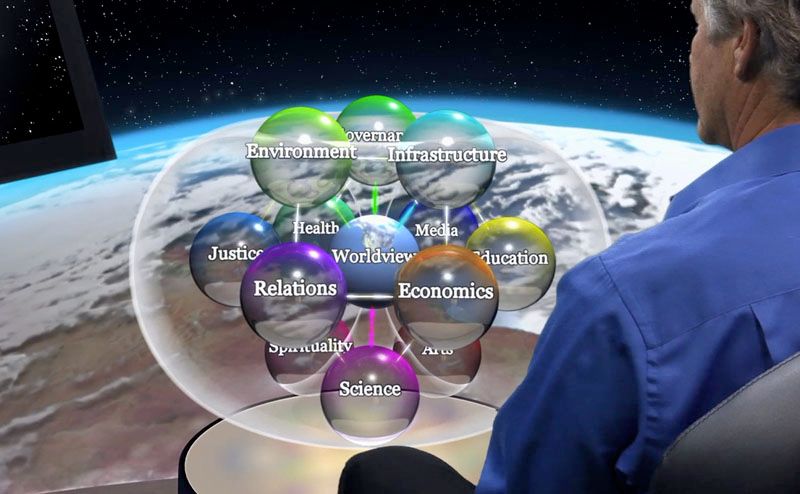
So what creates a Worldview?
- Burning a finger on a hot stove informs our future behavior.
- Being told what to eat by our parents shapes our early diets.
- Being abused triggers avoidance and kindness engenders trust.
Each moment’s experience gives us feedback for adjusting the our lens on life. On a larger scale, however, our beliefs are predominantly determined by those who control our access to information (media) and our social structures, (including schools), because these institutions dictate what beliefs and behaviors are rewarded and which are punished. My research has convinced me that the prevailing worldview of the 21st century, in which war is considered a viable or necessary means of problem solving, that starvation is inevitable for some people on this planet, and that it is right for some people to tax and control others against their will, is the result of well-organized elite who own the systems through which information and values are disseminated.
Way back people got their beliefs from tribal leaders, then “royal” rulers, feudal lords, the Church, then the “State” (government) and then the corporations that control them and now the major banks who control the corporations who are in this position.
At the top of that pyramid are a very few individuals, usually members of secret societies like the Council on Foreign Relations, the Round Table, The Royal Institute of International Affairs, The Bilderberg Group, the Trilateral Commission and others. They use the media, education, pharmaceutical and military pyramids they control to shape our thinking, and therefore our behavior — ideally through subtle mind manipulation, but, if necessary, through coercion and violence.
It is vital to consider the motivation and funding sources of those who are shaping our worldview: news sources, role models, scientific and religious organizations, employers, schools etc.
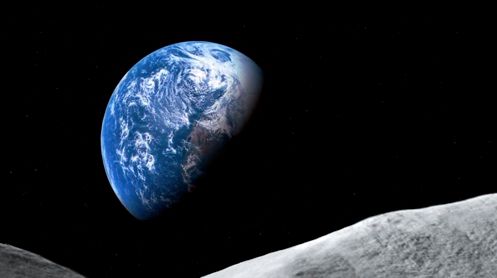
We are careening into a world of a few haves and billions of suffering have-nots. The Global Domination Agenda section of THRIVE and this site make the case that this is not an accident but an intentional plan. It’s hard to imagine the worldview of individuals who would actually spend their days planning the suffering or elimination of others, but it is critical to consider this if we want to protect one another, as well as our planetary home, and to turn the direction of humanity toward thriving.
If you were intimidated as a child and taught that you were either going to be in control or be controlled, it would make some sense that you would choose control, and devote your life to getting and staying in charge over others. Unfortunately our political and economic systems reward this.
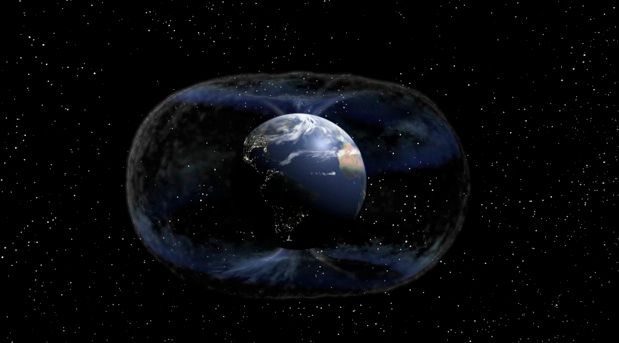
How do I discover what my own Worldview is?
I suggest you create a personal profile of your belief system with a list of questions something like this:
- Who am I?
- Do I have a body or does my consciousness arise from the combination of cells that is my body?
- Do “I” survive the death of my physical body?
- Should I believe what seems popular or strategic to believe, or can I truly think for myself and trust my direct experience?
- Am I part of a larger power or intelligence than me?
- If so, how do I relate to or communicate with it?
- Is it separate from me?
- What gives meaning to my existence?
- What is my purpose and the purpose of life?
- What is the nature of my connection with others?
- What does it mean to love and be loved?
- What do I need to be fulfilled?
- What are basic human rights?
- What is freedom?
- Should others be able to tell me what I can exchange, ingest, or do…or should I be able to decide these things for myself.
- Which is more primary in finding our way, the rights of the individual or the opinion of the majority about what’s “good for the group?”
- Is our reality bounded or open?
- Is the universe basically trustworthy or not?
- Is there such a thing as good and evil?
- What is integrity, and does it matter to the quality of life?
What moves any one of us from one worldview to the next?
My observation leads me to believe that human beings have an innate cost / benefit assessment tool operating all the time. Only when there is a sufficient combination of compelling evidence, emotional completion, and an adequate sense of future security do we let ourselves actually change our minds. And these have to outweigh the perceived cost of changing “who we thought we were.”
I can’t overstate how thoroughly I see people identify themselves AS their belief systems. If someone thinks that what they have is who they are, and it goes away during a great depression, they might jump out a window. If they think they are their reputation and they have a setback or get slandered, they might decide life is not worth living. If they think they are their position in the power structure, and it is threatened, they might sell out their core values to keep their status. If they are scientists who have believed something all their lives and a more compelling argument or evidence challenges their theoretical foundation, they might become hostile or think they are going to die. This latter example I have witnessed first hand.
Our era is intensifying the almost daily choice for each of us — faced with a moment of unknowing, a new challenge, do I:
- Try to look good, be “right” and keep my old self in tact, or do I…
- Allow true curiosity, open my mind and heart and go for what’s true, and for being more alive and thriving?
“When an honest man discovers he is mistaken,
He will either cease being mistaken,
Or cease being honest.”
— Anonymous
In my research through the decades, I found a striking correlation among a sampling of humanity’s premier cosmologists and cultural historians regarding how ways of viewing the world developed over the millennia it took to get where we are today. They virtually all describe an octave of stages in the process of becoming a mature species living in harmony with our environment, and seem to independently agree that we are about in the middle of a whole process, facing a lethal challenge with a profound urge to survive and yet without any guarantee of success.
Here’s a clip with a succinct summary of my findings in correlating the work of such consciousness researchers as Arthur Young, Duane Elgin, Ken Wilber, Ashok Gangadean, Clare Graves and Richard Barrett.
Researcher Paul Ray has done international polling on so-called “Cultural Creatives” — people who actually shape their lives around values based on peace, justice and ecology. His polls now show the percentage of these people in the US to be around 35% of the population. That was then around 80 million adults. Similar percentages were seen in Europe and Japan.[1]
Paul Hawken has reported over one million not-for-profit organizations worldwide that are self-created and working for peace, justice and a sustainable environment. He describes this as the largest leaderless spiritual movement in history.
The universe is not an aggregate of objects, but a communion of subjects.
— Thomas Berry
Linguist George Lakoff describes the emerging shift from what he calls the “strict father” morality to a “nurturing” parent model.
“The strict father model begins with a set of assumptions:
- The world is a dangerous place and it always will be, because there is evil out there in the world.
- The world is also difficult because it is competitive.
- There will always be winners and losers.
- There is an absolute right and an absolute wrong.
- Children are born bad, in the sense that they just want to do what feels good, not what is right. Therefore, they have to be made good.
What is needed in this kind of a world is a strong, strict father who can:
- Protect the family in the dangerous world,
- Support the family in the difficult world, and
- Teach his children right from wrong.
What is required of the child is obedience, because the strict father is a moral authority who knows right from wrong. It is further assumed that the only way to teach kids obedience — that is, right from wrong — is through punishment, painful punishment, when they do wrong. This included hitting them,…and some recommend sticks, belts, and wooden paddles on the bare bottom… Without such punishment, the world will go to hell. There will be no morality.
…Think for a minute about what this says about foreign policy. Suppose you are a real moral authority. As a moral authority, how do you deal with your children? Do you ask them what they should do or what you should do? No. You tell them. What the father says, the child does. No back talk. Communication is one-way. It is the same with the White house. That is, the president does not ask: the president tells. IF you are a moral authority you know what is right, you have power, and you use it. You would be immoral yourself if you abandoned your moral authority. Map this onto foreign policy and it says that you cannot give up sovereignty. The United States, being the best and the most powerful country in the world — a moral authority — knows the right thing to do. We should not be asking anybody else.
…The “rational actor” metaphor.. is the basis of most international relations theory, and in turn it assumes another metaphor: that every nation is a person…there are adult nations and child nations, where adulthood is industrialization. The child nations are called “developing” nations or “underdeveloped” states. Those are the backward ones. And what should we do? If you are a strict father, you tell the children how to develop, tell them what rules they should follow, and punish them when they do wrong. That is, you operate using, say, the policies of the International Monetary Fund.
The strict father worldview is so named because according to its own beliefs, the father is the head of the family.
The nurturant parent worldview is gender neutral.
Both parents are equally responsible for raising the children. The assumption is that children are born good and can be made better. The world can be a better place and our job is to work on that.
Nurturance…means two things: empathy and responsibility. If you have a child, you have to know what every cry means. You have to know when the child is hungry, when he needs a diaper change, when he is having nightmares. And you have a responsibility — you have to take care of this child. Since you cannot take care of someone else if you are not taking care of yourself, you have to take care of yourself enough to be able to take care of the child.
If you empathize with your child, you will provide protection,…you want your child to be fulfilled in life, to be a happy person. It is your moral responsibility to teach your child to be a happy, fulfilled person who wants others to be happy and fulfilled.
There are still other nurturant values:
…freedom, opportunity and prosperity, fairness, open two-way communication, community building, service to the community, and cooperation in a community, trust, honesty.”
— George Lakoff, Don’t Think of an Elephant
The Spiral Dynamics group predicts three possible futures for humanity at this time.
- A massive regression back to our stone-age beginnings if we fail to stabilize our world’s weapons and endangered resources
- A version of George Orwell’s 1984, embodied in forms of BLUE-ORANGE-GREEN tyrannical, manipulative government
- The emergence of a Second Tier approach to business and society which would be fundamentally different from the one we know today, a holistic order of being focused on the good living of all entities as integrated systems.
“When someone with crude moral development gets access to high level technology, that’s when you have the gravest danger.”
— Ken Wilber, Kosmic Consciousness
“Whether it is to be Utopia or Oblivion will be a touch-and-go relay race right up to the final moment… Humanity is in ‘final exam’ as to whether or not it qualifies for continuance in Universe.”
— R. Buckminster Fuller, Critical Path
Fork in the Road
We are at a critical crossroads where our information and our courage enables us to choose to create a thriving world based on protecting the rights of every individual or our recent trajectory of misinformation and confusion continues to lead us into a global police state — seeking daily permission to act from the dictators of a one-world tyranny.
We outnumber the perpetrators of the agenda by over a million to one. They cannot control us unless they can control our minds. As we wake up, do our own thinking, connect with others and take action, humanity has what it takes to thrive.
Now, as this website is launching across the world, the desperation and resentment of those calling themselves “the 99%” is merging with the groups identified by Hawken and Ray above the first truly global revolution is emerging.
It does not have a leader. Each person’s inner guidance is leading, and we are finding ways — with the Internet, with hand signs, with daily council circles and a myriad of others to honor that.
It does not yet have a clearly defined set of strategic goals. It is the result of the moral outrage against corruption, deceit, and brutality. It is fitting that people are finding how to mobilize based on everyone’s rights before getting too focused down, rather than just doing the next centralization of power into the hands of a few. The movement is naturally first seeking a core morality to guide the great turning of humanity away from the destructive practices in every field that have put the life of the planet and its species at mortal risk.
“It is not enough just to become more conscious. It matters deeply what you become more conscious of.”
— Neal Rogin
New worldviews are struggling to be born that feel right with no reservation, and for which people can stand whole-heartedly.
Please explore the Liberty section of this site for a deeper exploration of core ethical principles that can be our compass at this critical fork in the road in human history.
It starts with the honoring of the intrinsic rights of each individual to the security of their own person, property and privacy, and to have just contracts honored. These are all rights that can merely be defended rather than having to be aggressively coerced.
“We know we are not wise with our power when the effects of our actions are the opposite of our intent…We are not just threatening to end western civilization, — but the whole Cenozoic period 65 million years of evolution.
Our sentience, our feelings of wonder and awe emerge out of the universe… These profound feelings are not just ours; they are the universe reflecting upon itself… To live is to enter this beauty, surrounded by enchantment, summoned by magnificence.
We need to remember the universe, to study the cosmic story, the Earth story, the human story, until we know it in its essential forms… to know the story of life includes eating natural foods; to know the story of human civilizations means feeling the profound intuitions they achieved; and to know the story of the universe means to allow the great numinous past to come alive in your present being.
What we eventually discover in our passionate remembering of the galactic, terrestrial, biological and human stories is that a study of the universe is a study of self.”
— Brian Swimme
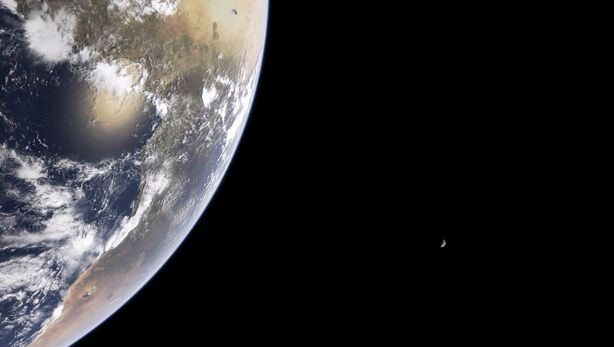
“Our crisis is a birth. We are one living system and we have come to the limit of one phase of natural growth on a finite planet. … We must learn ethical evolution quickly… As we seek to facilitate a gentle birth, a graceful and nonviolent transition to the next stage of our evolution, we will discover a natural pattern, a design of our birth transition, and develop a plan to cooperate with this design.”
— Barbara Marx Hubbard
“This is not a single-step process—that is at least a seven-step process! There are at least seven fulcrums, seven massive paradigm shifts, involved in getting you to a realization of this World Soul!
But the essential point is that at these higher or transpersonal stages, the Spirit that was present throughout the entire evolutionary process becomes increasingly conscious of its own condition. It has gone from subconscious to self-conscious to superconscious, unfolding more of itself and enfolding more of itself at every stage. Spirit slumbers in nature, begins to awaken in mind, and finally recognizes itself as Spirit in the transpersonal domains—but it is the same Spirit present throughout the entire sequence: the ground, path and fruition of the whole display.
With Spirit’s shocking Self-recognition, forms continue to arise and evolve, but the secret is out: they are all forms of emptiness in the universe of One Taste, endlessly transparent and utterly Divine.”
— Ken Wilber, A Brief History of Everything
“We all know the powerful addiction of money, power, career, and ego needs of every type. This momentum has kept suffering alive despite the enormous changes in human existence from age to age. Against this momentum the soul provides a means of solving every cause of pain:
1. Ignorance of reality is solved by delving deeper into the mind. Awareness dives deeper than the material level to find its roots.
2. Identification with ego is solved by learning to identify with these deeper levels.
3. and 4. Attraction to outside objects—and repulsion from them—is solved by valuing the inner life above all.
5. Fear of death is solved when the soul is experienced directly, since the soul is never born and never dies.
As with the five causes of suffering, the five solutions all grow from the first one. If you explore the true nature of reality, all pain will eventually come to an end.”
— Chopra, Deepak, How to Know God
The last thing we intend with Thrive is to have you take on, unquestioningly, a new set of beliefs. Our film and this ever-growing web portal are offerings to save you time gathering information, to encourage new types of questions, to nurture your own critical thinking and freedom from authority.
“Everything we need is already here and we can access it by recognizing and acting from our oneness.”
— Kimberly Gamble
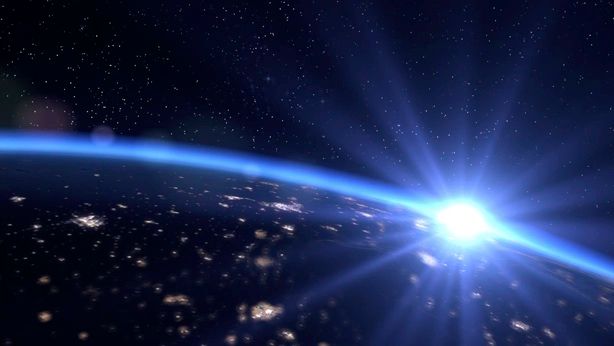
Footnotes
[1] The Potential for a New, Emerging Culture in the U.S. Report on the 2008 American Values Survey By Paul H. Ray, Ph.D. Research Director, Institute for the Emerging Wisdom Culture, Wisdom University, and Research Director, State of the World Forum
